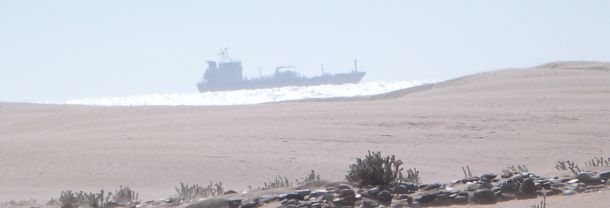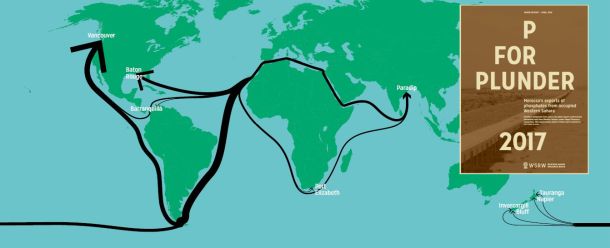
For the first time, Portugal is the biggest exporter of gas products into occupied Western Sahara.
PHOTO :The port of Sines, Portugal. @Wikipedia/CreativeCommons.
A new country has taken over as the most important source of gas supplies into occupied Western Sahara: Portugal. This is the conclusion of Western Sahara Resource Watch's (WSRW) daily monitoring of ship movements for last year.
In total, 14 cargos of liquified butane gas found their way to El Aaiún in occupied Western Sahara in 2023. Based on the analysis of the vessels' routes and draughts, WSRW estimates the total cargo at around 36,000 tonnes of gas, slightly less than the year before. The transports were made by thirteen different so-called LPG tankers.
Four of the vessels departed from the port of Sines, Portugal, during the year. Our estimations show that combined, they contained approximately 13,600 tonnes of gas, or 38 percent of the total amount exported to the territory in 2023. It is not clear to WSRW who the exporting company in Terminal de Graneis Liquidos (GGL), Sines, is.
Like last year, the US remains a prominent exporter of gas into the occupied territory. The first gas shipment that WSRW ever observed from the US was in April 2021, and exports have continued since. WSRW projects the volume exported from the US to Western Sahara in 2023 at around 10,000 tonnes, substantially lower than the record year of 2022, when the US exported 17,000 tonnes. The US exports in 2023 departed from Corpus Cristi, Houston and Norfolk.
Exports also took place from a terminal belonging to the company BP in Netherlands, and from Sarlux South Refinery in Sarroch, Italy, over the course of 2023. The shipment from A Coruña in Spain departed from a terminal belonging to Repsol - a company which failed to respond to a February 2022 letter from WSRW.
The total volume of gas imported into the occupied territory in 2023 was on par with the volumes of 2022, 2021, 2020 and 2019.
Morocco does not produce gas but is, according to Index Mundi, a top-tier importer and consumer of butane gas. Much of that gas is spent fueling the machinery of the occupation in Western Sahara, upholding infrastructure and industries that are critical to Morocco's illegal settlement policy.
The imported gas enters the territory on tanker ships specifically made to transport liquified gas (LPG).
As in previous years, two shipping companies stand out as most responsible in the transports:
- The most involved is the Singaporean/Norwegian/Danish shipping company BW Epic Kosan (BWEK, formerly Epic Gas). 6 of the 14 shipments were on board of vessels of the BWEK fleet: Emily Kosan, Epic Borinquen, Epic Sardinia, Epic Shikoku, Epic Salina and Epic Susak. WSRW expects that approximately 16,800 of the 36,000 tonnes were carried on BWEK ships - or around 45% of the trade. The Norwegian Support Committee has written to BW Epic Kosan and BW Group seven times from 2020 to 2023 (including 30 September 2021), without receiving an answer.
- Komaya Shipping had four vessels in its fleet taking part in the trade: Kennington, Kingston, Kirkby and Knebworth. The ships transported an estimated 9,000 tonnes, or 25% of the gas.
As in earlier years, also a ship of the Eco fleet - operated by the Greek shipping company Stealth Corp - was involved. The company was contacted regarding the practice on 25 April 2020 and 5 June 2020, but the letters were not responded to.
The article continues under the table.

The involved vessels in 2023 are: Coral Lacera, Eco Lucidity, Emily Kosan, Epic Borinquen, Epic Salina, Epic Sardinia, Epic Shikoku, Epic Susak, Kennington, King Arthur, Kingston, Kirkby, and Knebworth. The tankers are registered in Italy, Liberia, Malta, Marshall Islands and Singapore.
The list above shows the ports that WSRW reckons the gas was exported from, but don't reflect the actual origin of the gas.
A large part of the territory of Western Sahara has been under illegal occupation by Morocco since 1975.
Since you're here....
WSRW’s work is being read and used more than ever. We work totally independently and to a large extent voluntarily. Our work takes time, dedication and diligence. But we do it because we believe it matters – and we hope you do too. We look for more monthly donors to support our work. If you'd like to contribute to our work – 3€, 5€, 8€ monthly… what you can spare – the future of WSRW would be much more secure. You can set up a monthly donation to WSRW quickly here.
New report reveals the companies transporting conflict phosphate rock
A new report published by WSRW today reveals the names of around 100 shipping companies behind the transport of phosphate rock from occupied Western Sahara in 2016 and 2017.
New report: Western Sahara phosphate trade halved
The export of phosphate rock from occupied Western Sahara has never been lower than in 2019. This is revealed in the new WSRW report P for Plunder, published today.
New report on Western Sahara phosphate industry out now
Morocco shipped 1.93 million tonnes of phosphate out of occupied Western Sahara in 2018, worth an estimated $164 million, new report shows. Here is all you need to know about the volume, values, vessels and clients.
New report on contentious Western Sahara phosphate trade
Morocco shipped over 1.5 million tonnes of phosphate out of occupied Western Sahara in 2017, to the tune of over $142 million. But the number of international importers of the contentious conflict mineral is waning, WSRW's annual report shows.



